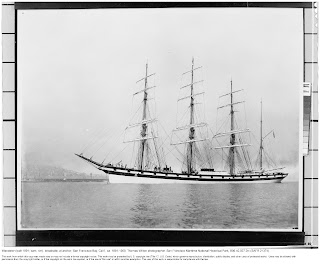(by Ted Miles, Assistant Reference Librarian)
 |
| Wanderer of Liverpool at anchor in San Francisco Bay, circa July 1892. Photo by Thomas H. Wilton (B6 40,027nl) |
John Masefield ( 1878-1967) started by joining the Training Ship Conway intending to be an officer in the British Merchant Navy at that time the largest in the world. After completing his schooling in 1894, he went to sea as an Apprentice in the Gilcruix (iron 4 mast ship, built 1883) and several other vessels; he had seen the famous and beautiful Wanderer (steel 4 mast bark, built 1890). He wrote a detailed biography of the vessel. But he had to abandon his sea career due to poor health. After a period of odd jobs he settled into a successful career of writing and lecturing in England and the United States.
But his early life at sea provided the creativity that produced Salt Water Ballads in 1902. And many of his sea poems also appeared in his Collected Poems in 1922 which sold over 80,000 copies.
The poem is a tribute to the Port of Liverpool and to the vast fleet of ocean going square riggers that once crowded its harbor and wet docks. From it comes:
Lochs, Counties, Shires, Drums, the countless linesWhose house-flags were all once familiar signsat high main-trucks on Mersey’s windy daysWhen sunlight made the wind-white water blaze.Their names bring back old mornings, when the docksShone in their house-flags and their painted blocks,Their raking masts below the Custom houseAnd all the marvelous beauty of their bows….That nobleness and grandeur, all that beautyBorn of a manly life and bitter duty,That splendor of fine bows which yet could standThe shock of rollers never checked by land.That art of masts, sail crowded, fit to break,Yet stayed to strength and backstayed into rake,the life demanded by that art, the keenEye-puckered, hard-case seamen, silent lean,--They are grander things than all the art of towns,Their tests are tempests and the sea that drowns,They are my country’s line, her great art doneBy strong brains laboring on the thought unwon,They mark our passage as a race of men,Earth shall not see such ships as these again.
This last couple of lines is the most often quoted of Masefield’s poetry. The poet became Poet Laureate of the United Kingdom in 1930 and was given an honorary doctorate from Cambridge University in 1931. That is a pretty successful effort for a boy who liked to read and expected to go to sea in a square-rigged sailing vessel.
The Poems and Plays of John Masefield (Volume One Poems) by John Masefield, (New York: The MacMillan Company) 1922. Pages 68, 69, 70 and 71.